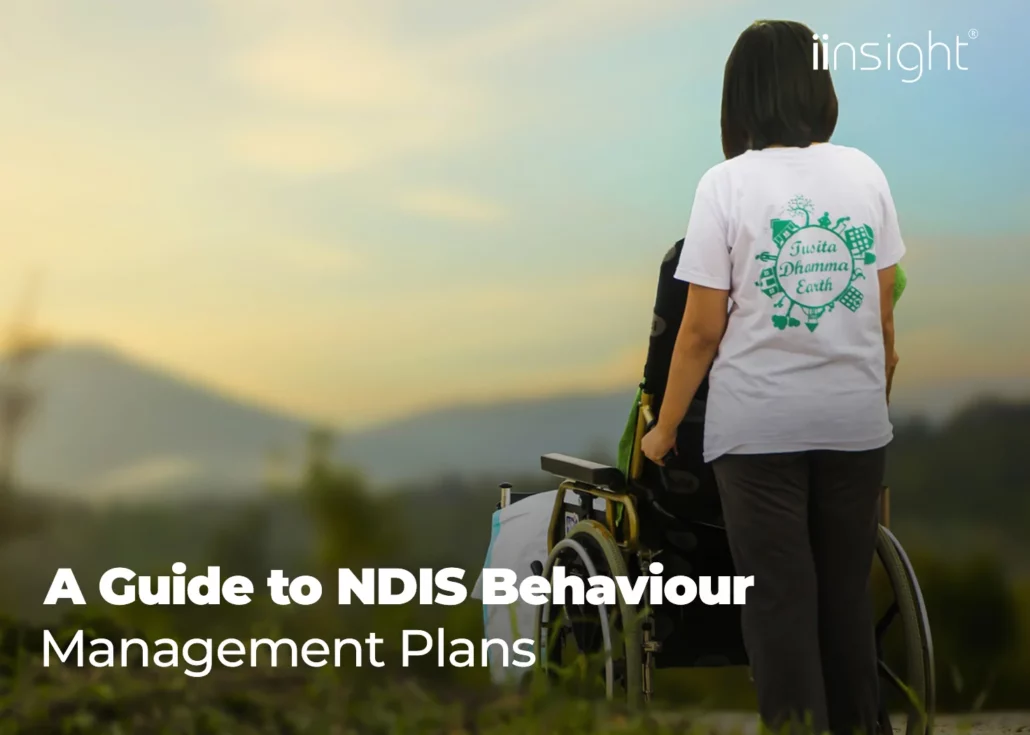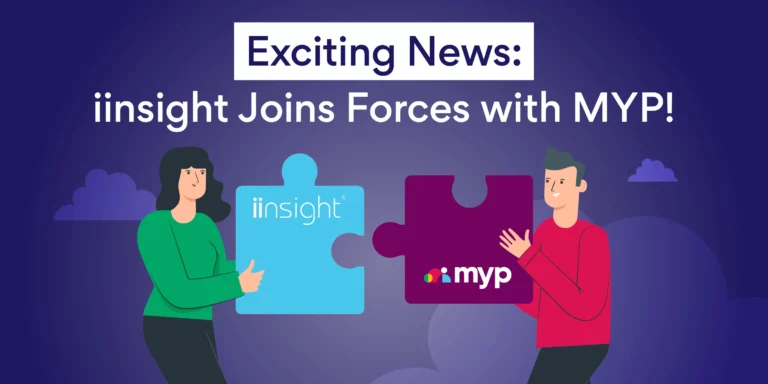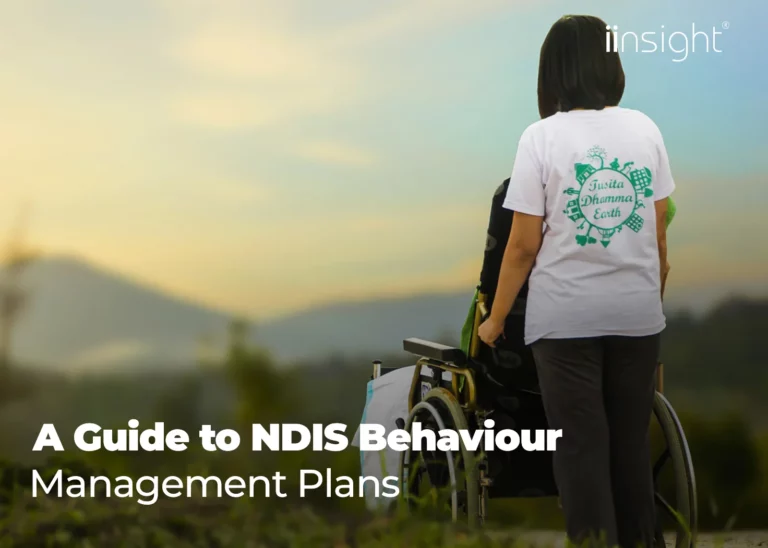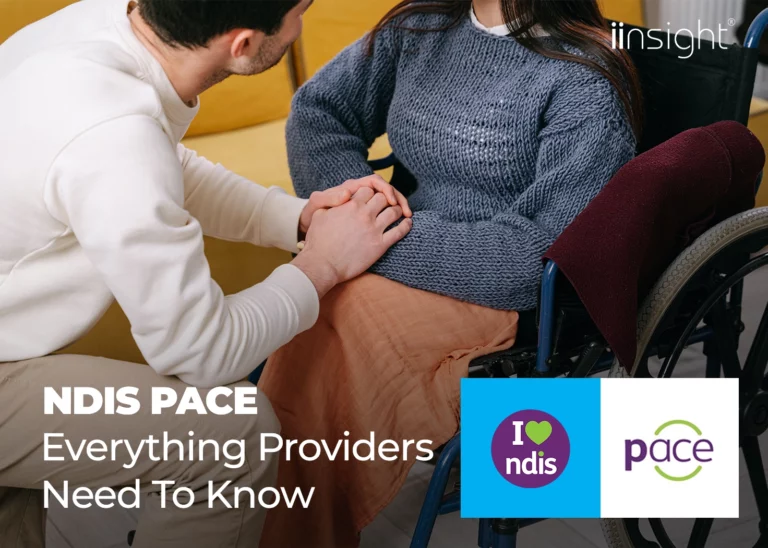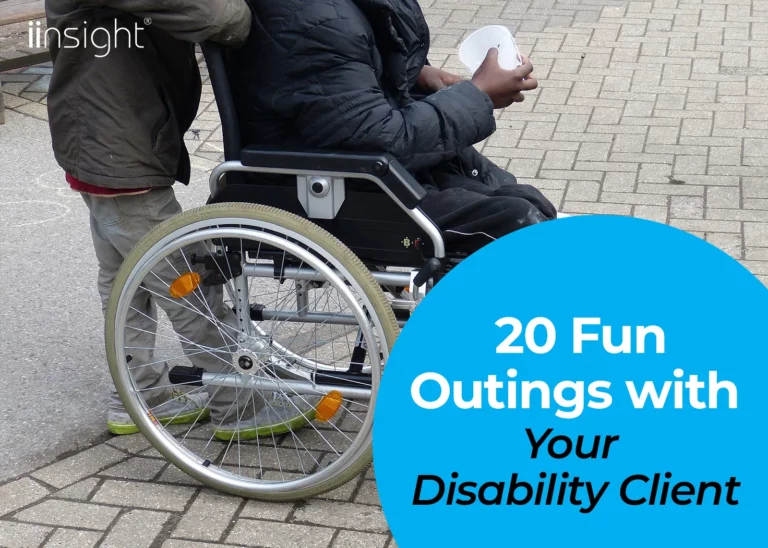Behaviour management NDIS plans are a key ingredient in the recipe for providing better care to Australians living with disabilities. If your company is a registered NDIS provider, understanding NDIS behaviour management plans should be a priority.
With Iinsght’s intuitive and scalable case management software, staying on top of allied health and behaviour management NDIS strategies. Before utilising the advanced tech solutions, this quick guide will answer your key questions like;
- What are NDIS behaviour management plans?
- Why is behaviour management NDIS important?
- What are the key components of a behaviour management NDIS plan?
- How can iinsight support NDIS providers?
If you’re ready to take your strategy as an NDIS provider to the next level, read on.
What are NDIS behaviour management plans?

NDIS behaviour management plans are personalised documents that are designed to address the behavioural needs of a person living with disabilities. They are developed by Commissioner-approved practitioners with support from the individual, their families, and registered caregivers.
Behaviour management NDIS plans can be used to support individuals with complex requirements as well as those who have less dramatic requirements. So, all 610,000+ Australians who benefit from the NDIS scheme can enjoy better healthcare as a result of the document.
The documents are aimed to help all carers and NDIS providers who work with the patient and should be accessible to all relevant plans. While only NDIS plans that contain a regulated restrictive practice need to be recorded with the Commissioner, plans should be prepared for all participants in the NDIS scheme.
Why is behaviour management NDIS important?
Behaviour support is one of the critical aspects of programs by NDIS practitioners and service providers for many reasons. Individualised strategies for each person living with a disability will ensure that a personalised approach is used to address the specific needs of the individual.
The overriding purpose of an NDIS behaviour management plan is to reduce the need for regulated restrictive practices by putting positive behaviour management strategies in place. Therefore, the benefits for the individual living with a disability are plentiful, including but not limited to;
- Avoid (or at least significantly reduce) the frequency of experiencing regulated restrictive practices and the emotional stresses that follow.
- Benefit from consistent behavioural management offered by all carers and their NDIS provider.
- Experience fewer challenging situations as practitioners will be better positioned to identify and manage them earlier.
In short, it will lead to an increased quality of life for the individual living with a disability. Better still, they will retain a far greater level of dignity. For families, it makes a huge difference to know that their loved one will receive a better quality of care. Likewise, it can help them gain a better understanding of how to manage behavioural issues without compromising safety or causing too much stress for their loved ones.
For NDIS providers, behaviour management NDIS documents provide guidance on how to deliver a better quality of care. It also removes any doubts and is a reminder of an individual’s behavioural needs, which is particularly useful when working with a new patient. It additionally ensures that all support can be provided in alignment with the National Disability Insurance Scheme (Restrictive Practices and Behaviour Support) Rules, as well as the NDIS Quality and Safeguarding Commission Regulations.
Moreover, senior practitioners can use this as a key tool for keeping all carers aware of the individual needs of each NDIS participant while simultaneously creating a record of care. This is made even easier with a cloud-based case management program.
What are the key components of a behaviour management NDIS plan?

Understanding the role and importance of behaviour management NDIS documents is one thing. However, knowing how to build an efficient plan is another altogether. There are several key components that should be included when developing a plan. The most vital ones are detailed below:
Regulated restrictive practices
While one of the main functions of NDIS behaviour management plans is to reduce (or even remove) the need for regulated restrictive practices, the harsh reality is that thousands of people living with disabilities that involve more complex behavioural needs will have to be restricted in certain circumstances.
The NDIS provides a full Regulated Restrictive Practices Guide to deliver full details. Ultimately, though, regulated restrictive practices fall into the following five categories;
- Chemical restraint – using medication and/or chemical substances to bring the individual’s behaviour back under control.
- Environmental restraint – putting restrictions in place so that the individual is unable to access certain areas where their behaviour could lead to damage.
- Mechanical restraint – using mechanical equipment to limit the individual’s movement until their behaviour returns to a manageable level.
- Physical restraint – using physical force to limit the individual’s movement until the outburst has ended.
- Seclusion – putting the individual in a safe space for temporary confinement until their behaviour has returned to a safe level.
As well as lodging the behaviour management NDIS plan, NDIS providers must record any use of regulated restrictive practices. In most cases, this is done monthly, although individual care providers may adopt a different approach.
Behaviour support plans
The use of regulated restrictive plans should be limited to the last resort. Likewise, the NDIS behaviour management plan should stipulate that the least restrictive practice is used (and for the shortest amount of time) to limit the negative impacts. Crucially, though, more positive management steps should be prioritised.
A Behaviour Support Plan (BSP) should be utilised and built upon the ‘seven Ps of positive behaviour support’. This stipulates that plans should be; Person-centred, Partnership, Planned, Positive, Purposeful, and Process-driven.
Implementing a BSP should address several areas of a person’s life and ongoing care to unlock the following outcomes;
- Reduce the individual’s harmful behaviours – to themselves and others,
- Identifying the person’s strengths and areas for skill development,
- Supporting interaction and communication through environmental changes.
The positive behaviour support plan should ultimately shift the focus away from restrictive elements (although they will be included) and towards building positive strategies.
Reporting
Reporting all developments from the initial consultation onwards is vital for many reasons. Above all else, though, it allows NDIS providers to track progress and ultimately make adjustments as needed to deliver the best quality of care. Better still, it achieves this while simultaneously satisfying legal requirements and keeping all relevant parties, including families, updated.
Using behaviour management NDIS reporting to stay connected with the family is particularly important as research shows that 76.6% of Australians living with disabilities live with their families. Therefore, reporting should begin with recorded evidence of the consultation process and followed by details of the behaviour support plan strategies and protocols for managing regulated restrictive practices – this should include details of which practices are preferred.
As well as recording all situations in which regulated restrictive practices are used, NDIS providers should complete strategies for monitoring the situation including team responsibilities and regular analysis to identify opportunities for improved plans.
How can iinsight support NDIS providers?

Appreciating the importance of behaviour management NDIS plans is one thing, but implementing it successfully is another. Drawing up a document that highlights the regulated restrictive practices, as well as the positive behaviour support plans that are used as a priority, provides a solid platform to build upon. However, it should be a living document that can also be accessed by healthcare workers. iinsight’s cloud-based case management software is the perfect choice for NDIS providers.
The case management programme is specialised for positive behaviour support, allowing practitioners to create well-rounded plans based on a complete assessment of a patient’s condition. This helps decrease an individual’s challenging behaviours and promotes skills development and a better understanding of the patient’s requirements.
iinsight is the ideal choice for a variety of other reasons, including but not limited to;
- The software is built with the NDIS regulations in mind, ensuring that all NDIS providers can satisfy their obligations relating to behaviour management and regulated restrictive practices.
- It facilitates holistic approaches to Positive Behaviour Support and other such types of therapeutic programs, which ultimately leads to more effective interventions whenever they are needed.
- The software helps streamline the admin processes involved in behaviour support plans, thus enabling you to spend more time actively attending to the patient and their requirements.
- In addition to providing access from anywhere in the world due to the cloud-based capabilities, it is possible to set different credentials for each user. Meanwhile, the software is protected by advanced cybersecurity.
- The iinsight software’s intuitive UI and UX give NDIS providers optimal control at every stage of the process. Moreover, the package is fully scalable, meaning you can increase your requirements as the company grows.
Thanks to its array of features tailored to NDIS providers, iinsight is the perfect choice with a business-friendly licensing model. In turn, it allows you to deliver the best results for the patients and their families, which ultimately supports your workforce too. The fact that case management will be stored in one place will save time and money.
To find out more about iinsight’s case management capabilities, contact our experts to arrange a full demonstration today.

